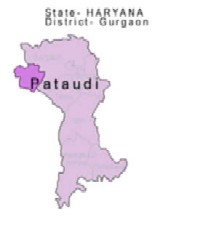|
The Pataudi X-perience TARAhaat started its expansion in Punjab in September 2002 with funding from USAID with a purpose to establish TARAkendras with the capacity to deliver information products and services in the rural areas of the state. Presently, with a network of 41 TARAkendras, TARAhaat is expanding at a steady pace. The challenge is to expand this network at a rapid pace if TARAhaat is to achieve institutional stability and sustainability. With the TARAkendra network in Punjab growing steadily, TARAhaat’s focus shifted to Haryana as a new ground for expansion. Pataudi was identified as a suitable location because of the following factors: ◘ It lies in the rural belt of Gurgaon district, which has a very low literacy rate. ◘ Pataudi has a sizeable number of school going students, most of whom hail from the nearby towns and villages. ◘ Because of its proximity to Gurgaon, where numerous ITES industries have mushroomed, there is a good demand for English speaking and IT courses. Pataudi is a small town situated around 30 kms from Gurgaon on Gurgaon - Rewari highway. It has a population of around 18,000 and the literacy rate hovers around 74%. Almost 70% of the population is rural. About the TK The Pataudi TK operates as a COCO (Company Owned Company Operated) and was inaugurated in December of 2004. It is one of the best centres of TARAhaat in terms of infrastructure and set-up. Thanks to a dedicated and able staff, the centre is gaining a lot of recognition in and around Pataudi. It was primarily set up on an experimental basis for testing the waters in Haryana before a full-scale expansion could be undertaken. It has become a launch pad for various new products and services that TARAhaat continuously develops – a recent one being Personality Development. Apart from this, exposure in this new environ is providing us with vital inputs and learnings into the opportunities and challenges that await our penetration in this new region. To this effect, the experience gained from Pataudi TK has been extremely fruitful.
When this centre was opened in December, it was the first to offer a Tally course in Pataudi. Tally is an expensive accounting software widely used by companies and businessmen. In places like Gurgaon, a course in Tally can be beyond the reach of the rural customer due to its exorbitant cost. Our centre offers it at an affordable price and ensures quality through our trained instructors and effective course delivery mechanism. Presently, Tally is the most popular course running at the centre. The best part is that some of these students have received offers from local educational institutes and industries. This is a matter of great pride and infuses a sense of achievement in the TK staff and us at TARAhaat. On similar lines, the Pataudi TARAkendra was also the first in Pataudi to start a course in Internet that has attracted a lot of students. Two of our students after completing the course, used the new knowledge and their sense of entrepreneurship to set up a business. The business did quite well and they earned a fair amount of money in selling exam results to students. This was yet another shining example of TARAhaat empowering rural entrepreneurs with IT know-how for their own benefit and success. The students’ perception about the PELP (Practical English Learning Programme) has been very encouraging. The students have experienced perceptible changes in their writing and speaking skills after having gone through this course. “The PELP course has given me the confidence to speak to people in English. I have immensely benefited from the course,” says Hitesh Kumar. There has been a positive feedback from the students about the course and the instructors.
To expand their horizons, the centre has been deeply involved in developing a strong network among the locals through various contact programmes. Villages have been visited and with the help of the Sarpanch, meetings have been organized to brief the students and their parents about the benefits of computers and the importance of English in today’s job scenario. One of the villages which I visited along with the TK staff was Turkapur. The result of the meeting with the village head and the youths was encouraging. Till date there have been around twenty registrations from this village alone. Most of them have re-registered for other courses also. Also, links are being established with Principals of nearby schools and colleges to encourage their students to gain computer knowledge and improve their English skills. The Principal of DAV school in Haily Mandi (a place three Kms from Pataudi) has shown a special interest in our PELP course and further discussions are underway. The TK Team The team at the Pataudi TK comprises two instructors – one for IT courses (Lalit Kumar) and the other (Manoj Yadav) for the English Learning course. The latter is also the TARAkendra Co-ordinator (TKC) and is a recent induction. Both the staff members are young (in early twenties) and very dedicated. While Lalit has built a fairly good reputation among his students, Manoj is picking up fast. Both of these instructors hail from rural areas, and enjoy building the skills of the youth of the commuity. The present focus is on improving our outreach. My experience till date has shown that personal contact is a better way of communicating than just posters and leaflets. The personal contact may be through canopies, village contacts, school contacts, etc. The centre staff has been working hard in this department. My recent focus has been to train both of them in mass contact methods. At present, they are learning to do it the hard way. The good thing is that they are eager to learn and show results. Student Profile A majority of the students at our centres are from nearby towns and villages. As is evident from the graph alongside, nearly 80% of the members belong to the 14-25 years age group. These are primarily school and college going students. Around 65% of our students hail from nearby villages. These students come from nearly 6-7 of the surrounding villages. The extent of the centre’s recognition can be gauged from the fact that some of these students come from as far as 8-10 kms. This is a direct indication of the success of our outreach programmes in the villages. Challenges While walking this road to success, the centre has encountered quite a few challenges. The cultural barrier in Haryana has been one of the biggest impediments. This has especially been evident during cold-calls and mass contacts. The challenge has been to generate confidence and acceptance for TARAhaat among the rural and educationally backward people of the area. The strong cultural and social norms have made it difficult to attract girls to the centre. The present literacy rate among the female population in Pataudi is 61%, compared to 86% among the males. The USHA Sewing course that was launched in Pataudi also encountered this problem. Parents were not willing to send their daughters, and husbands would not allow their wives to venture out alone to an unknown place. Moreover, Sharmila Tagore (with support from GAIL) set up a charitable programme at the same time that funded a low-cost sewing and computer course for rural women in her palace, which attracted a lot of women from nearby villages. This is the difference that trust can bring. It is these challenges that need to be surmounted to realise success to the fullest extent. The Road Ahead As a Zen saying goes, “The truth is realised in an instant; the act is practiced step by step.” In this case too, there are many realisations from the exposure to Pataudi TK. Now, it is the ‘act’ that has to be ‘practiced’ to achieve results. All the implementation has to be centred on the learnings. This is easier said than done because of some of the inherent issues that have already been mentioned. Thus, it becomes important to constantly motivate and assure the centre’s staff that they are on the right track. The best part is that our efforts have yielded considerable results, and we are well on our way to overcoming these challenges.q
|

